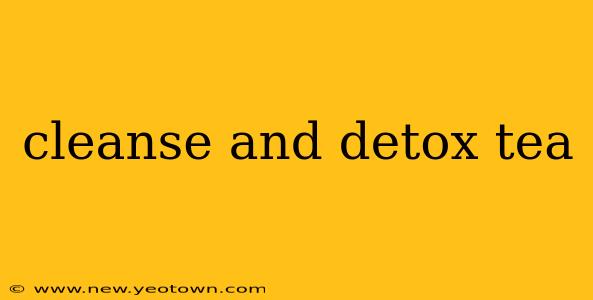The idea of a "cleanse" is alluring. We all crave that feeling of lightness, that sense of renewed energy after a period of indulging a little too much. And for many, cleanse and detox teas promise just that. But what’s the truth behind these popular brews? Are they the miracle cure-alls they're often portrayed as, or is there more to the story? Let's delve into the world of cleanse and detox teas, exploring their benefits, potential drawbacks, and the science (or lack thereof) behind their claims.
What are Cleanse and Detox Teas?
Imagine this: You’re sipping a warm, aromatic beverage, the subtle flavors dancing on your tongue. That's the appeal of cleanse and detox teas. These teas often blend various herbs, spices, and sometimes even fruits, each boasting unique properties purported to support detoxification and overall well-being. Common ingredients include:
- Ginger: Known for its anti-inflammatory properties and ability to soothe the digestive system.
- Lemon: Rich in Vitamin C, an antioxidant that supports the immune system.
- Hibiscus: Often touted for its potential blood pressure-lowering effects.
- Dandelion root: Traditionally used as a diuretic, potentially aiding in fluid elimination.
- Senna: A powerful laxative, often included for its purported cleansing effect (but proceed with caution, as we'll discuss later).
These teas are marketed as a way to flush out toxins, boost metabolism, and promote weight loss. But do they truly deliver on these ambitious promises?
Do Cleanse and Detox Teas Really Work?
The human body is remarkably efficient at detoxifying itself. Our liver and kidneys work tirelessly to filter out waste products and harmful substances. While certain components in cleanse and detox teas may have individual health benefits, the notion of a magical "cleanse" that eliminates all toxins is largely a misconception. The term "toxin" itself is often used loosely in marketing, encompassing a broad range of substances, some harmless and others genuinely dangerous.
What about the claimed benefits? Some ingredients, like ginger and lemon, offer genuine health benefits. Ginger can aid digestion, while lemon's vitamin C supports immunity. However, attributing weight loss solely to these teas is inaccurate. Sustainable weight loss requires a balanced diet and regular exercise.
What are the Potential Side Effects of Cleanse and Detox Teas?
While generally considered safe for most people when consumed in moderation, some ingredients in cleanse and detox teas can have adverse effects. For example:
- Laxative effects: Teas containing senna can cause diarrhea, dehydration, and electrolyte imbalances if overused. It's crucial to follow the recommended dosage instructions.
- Drug interactions: Some herbal ingredients might interact with medications. If you are taking any medication, consult your doctor before using cleanse and detox teas.
- Allergies: Be aware of potential allergies to ingredients like hibiscus, chamomile, or ginger.
- Pregnancy and breastfeeding: Many herbal teas are not recommended during pregnancy and breastfeeding. Always consult your doctor or midwife.
Are Cleanse and Detox Teas Safe for Everyone?
No, cleanse and detox teas are not suitable for everyone. Individuals with underlying health conditions, pregnant or breastfeeding women, and those taking certain medications should exercise caution and consult their healthcare provider before incorporating these teas into their routine.
What are the Best Cleanse and Detox Teas?
The "best" cleanse and detox tea is subjective and depends on individual preferences and needs. Look for teas with a blend of well-researched herbs and spices that suit your health goals. Remember to always check the ingredients list for potential allergens or ingredients you might react to.
How Often Should You Drink Cleanse and Detox Tea?
There's no one-size-fits-all answer. Moderation is key. Drinking these teas daily for extended periods might not be advisable, especially if they contain strong laxatives. It's best to follow the manufacturer's instructions and listen to your body.
Can Cleanse and Detox Teas Help with Weight Loss?
While some cleanse and detox teas might have a mild diuretic effect, leading to temporary weight loss due to water loss, they are not a magic bullet for weight management. Sustainable weight loss requires a holistic approach involving a balanced diet, regular exercise, and healthy lifestyle choices.
In conclusion, cleanse and detox teas can be part of a healthy lifestyle, offering potential benefits from their individual ingredients. However, it’s crucial to approach them with realism and moderation. They are not a substitute for a balanced diet, regular exercise, and proper medical care. Always prioritize a holistic approach to wellness and consult a healthcare professional before making significant changes to your diet or health routine.

